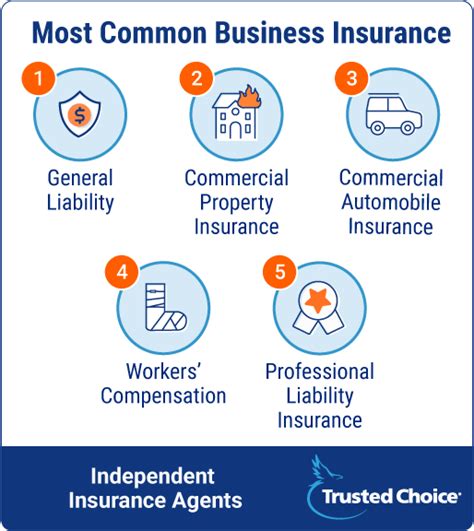Commercial Insurance Business

The world of commercial insurance is a complex and ever-evolving landscape, playing a crucial role in mitigating risks for businesses across diverse sectors. From small startups to multinational corporations, understanding and effectively managing commercial insurance is vital for long-term success and stability. In this comprehensive article, we delve into the intricacies of the commercial insurance business, exploring its significance, key components, and the impact it has on the business world.
Understanding Commercial Insurance: A Comprehensive Overview

Commercial insurance, also known as business insurance, is a specialized form of risk management tailored to the unique needs of businesses. It encompasses a wide range of insurance policies designed to protect companies against potential losses and liabilities arising from various operations and activities. These policies act as a safety net, providing financial protection and support in the face of unforeseen events that could otherwise disrupt or cripple a business.
The importance of commercial insurance cannot be overstated. It is an essential tool for businesses to safeguard their assets, reputation, and future prospects. By obtaining appropriate insurance coverage, companies can minimize the financial impact of incidents such as property damage, legal liabilities, employee injuries, and other unforeseen circumstances. This protection allows businesses to focus on their core operations, innovate, and grow without the constant worry of catastrophic losses.
Key Components of Commercial Insurance
Commercial insurance is a multifaceted field, offering a variety of coverage options to address the diverse needs of businesses. Some of the most common types of commercial insurance policies include:
- Property Insurance: This type of insurance provides coverage for physical assets owned by a business, including buildings, equipment, inventory, and other tangible property. It protects against losses resulting from events like fires, storms, vandalism, and theft.
- Liability Insurance: Liability insurance is crucial for businesses to protect against claims arising from accidents, injuries, or damages caused to third parties. This can include product liability, professional liability (errors and omissions), and general liability coverage.
- Business Interruption Insurance: In the event of a covered loss that disrupts normal business operations, this insurance steps in to cover lost income and ongoing expenses. It ensures that a business can continue to meet its financial obligations during temporary shutdowns.
- Workers' Compensation Insurance: This insurance is mandated by most states and provides coverage for employees who suffer work-related injuries or illnesses. It covers medical expenses, lost wages, and rehabilitation costs, ensuring employees receive necessary care and support.
- Commercial Auto Insurance: For businesses that utilize vehicles for operations, commercial auto insurance is essential. It provides coverage for owned, hired, or non-owned vehicles, protecting against accidents, damage, and liability claims.
- Cyber Liability Insurance: With the increasing reliance on technology and the growing threat of cyber attacks, cyber liability insurance has become a critical component of commercial insurance. It protects businesses from financial losses resulting from data breaches, hacking, and other cyber-related incidents.
The Impact of Commercial Insurance on Businesses

The influence of commercial insurance extends far beyond providing financial protection. It plays a pivotal role in shaping the strategic decisions, growth prospects, and overall resilience of businesses.
Risk Mitigation and Business Continuity
Commercial insurance acts as a powerful risk mitigation tool, allowing businesses to identify, assess, and manage potential risks effectively. By understanding the range of insurance coverage available, companies can develop comprehensive risk management strategies. This proactive approach not only protects their assets and operations but also ensures business continuity in the face of unforeseen events.
For instance, consider a manufacturing company that experiences a fire at its primary production facility. Without adequate property insurance, the financial burden of rebuilding and replacing equipment could be catastrophic, potentially leading to bankruptcy. However, with the right insurance coverage, the company can quickly recover, minimize downtime, and maintain its market presence.
Enhanced Credibility and Growth Opportunities
Commercial insurance is often a prerequisite for businesses to secure financing, attract investors, and establish partnerships. Lenders and investors view insurance as a sign of financial responsibility and stability, making it easier for businesses to access the capital needed for growth and expansion.
Additionally, insurance coverage can open doors to new business opportunities. For instance, many clients and vendors require proof of insurance before entering into contracts. By demonstrating a commitment to risk management through comprehensive insurance coverage, businesses can build trust and strengthen their position in the market.
Compliance and Legal Protection
Commercial insurance is not just a strategic choice but also a legal requirement in many cases. Various laws and regulations mandate specific types of insurance coverage for businesses, ensuring compliance and protecting the rights of employees, customers, and the public.
For example, workers' compensation insurance is mandatory in most states, ensuring that injured employees receive the necessary medical care and compensation without resorting to costly and time-consuming litigation. Similarly, liability insurance is often required for businesses operating in high-risk industries, providing protection against potential lawsuits and claims.
The Future of Commercial Insurance
The commercial insurance landscape is continually evolving, driven by technological advancements, changing business dynamics, and emerging risks. As businesses navigate an increasingly complex and interconnected world, the role of commercial insurance becomes even more critical.
Embracing Digital Transformation
The digital revolution has transformed the insurance industry, introducing new opportunities and challenges. Insurers are leveraging technology to enhance efficiency, streamline processes, and improve customer experiences. From online policy management and digital claims submission to advanced risk assessment tools, technology is revolutionizing the way commercial insurance is delivered and managed.
Adapting to Emerging Risks
As businesses embrace new technologies and expand into global markets, they face a myriad of emerging risks. From cyber threats and data breaches to supply chain disruptions and environmental liabilities, the risk landscape is constantly shifting. Commercial insurance providers are adapting their offerings to address these evolving risks, ensuring businesses have the coverage they need to stay protected.
Focus on Customization and Personalization
One of the key trends in commercial insurance is the shift towards customization and personalization. Recognizing that every business is unique, insurers are offering tailored coverage options to meet specific needs. This approach allows businesses to optimize their insurance portfolios, ensuring they have the right coverage at the right price.
Collaborative Risk Management
Insurers are increasingly partnering with businesses to provide comprehensive risk management solutions. This collaborative approach goes beyond traditional insurance coverage, offering risk assessment, mitigation strategies, and loss prevention services. By working together, insurers and businesses can identify and address potential risks proactively, reducing the likelihood and impact of losses.
Conclusion: Navigating the Commercial Insurance Landscape
Commercial insurance is a vital component of any business’s risk management strategy. By understanding the complexities and opportunities presented by the commercial insurance landscape, businesses can make informed decisions to protect their assets, reputation, and long-term viability. As the business world continues to evolve, the role of commercial insurance will remain pivotal, shaping the resilience and success of enterprises across industries.
What are the key factors to consider when choosing commercial insurance coverage?
+When selecting commercial insurance coverage, it’s essential to assess your business’s unique needs and risks. Consider factors such as the nature of your business operations, the value of your assets, potential liability risks, and any specific industry regulations. Work with an insurance broker or advisor who can guide you through the process and help tailor coverage to your requirements.
How can businesses ensure they have adequate insurance coverage without overspending?
+Achieving the right balance between coverage and cost is crucial. Start by conducting a comprehensive risk assessment to identify potential exposures. Then, work with insurance professionals to design a coverage plan that addresses your specific needs without unnecessary overlap or gaps. Regularly review and update your insurance portfolio to ensure it remains aligned with your business’s evolving needs.
What role does technology play in the future of commercial insurance?
+Technology is transforming the commercial insurance landscape, offering insurers and businesses new opportunities for efficiency, risk assessment, and customer engagement. From digital platforms for policy management and claims processing to advanced analytics for risk modeling, technology is enhancing the overall insurance experience. Insurers are also exploring the potential of emerging technologies like blockchain and artificial intelligence to further streamline processes and improve accuracy.



